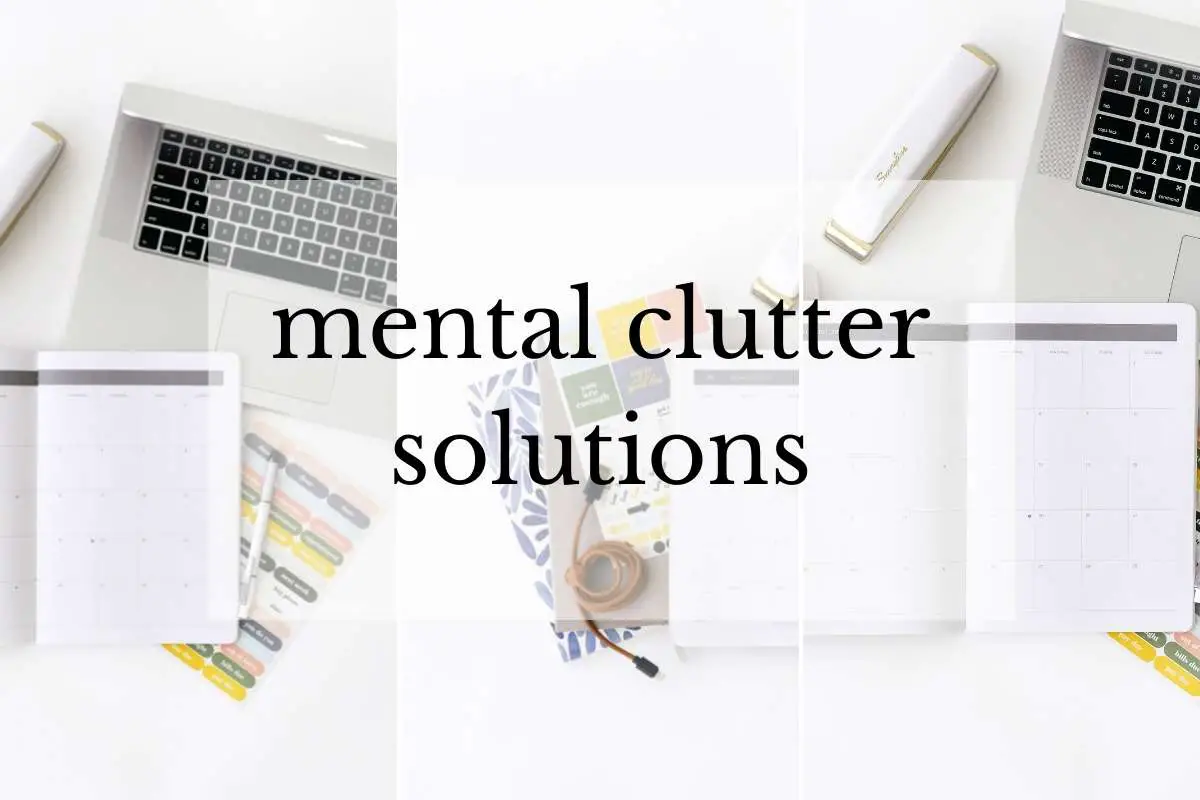Do you feel like your mind is constantly running and never able to slow down? Are you feeling overwhelmed with negative self-talk, random thoughts, and endless mental to-do lists? You’re not alone. Mental clutter can be a huge problem for many people, but it doesn’t have to be. With the right tools, you can learn how to reduce mental clutter so that you can live a happier life with more peace of mind.
If you want more clarity in life, we’re going to cover how to declutter your mind for good! You’ll finally be able to focus on the essential things in life without being bogged down by unnecessary thoughts or distractions.
Let’s talk about how to get rid of mental clutter and prevent it from accumulating in the first place.

What is mental clutter?
Well, we all understand clutter to be random stuff floating around that has no place to be and serves no apparent purpose. Mental clutter is thoughts, concerns, or ideas that are in your head and aren’t benefitting you in any way. Mental clutter can be damaging and cause stress and sleepiness nights, or it might be less severe and simply distracting.
In any case, you want to clear your head of clutter. Here are some easy strategies that can help.
Why it’s different from physical clutter
Mental clutter is not the same as physical clutter, although there is absolutely some overlap. Mental clutter can cause physical clutter. For example: if you’re stressed and anxious about a project, and that stress and anxiety keep coming back, it might manifest as physical messiness or disorganization of your workspace.
And if you live in a chronically disorganized or messy house, it can cause mental clutter as you start taking note of all the things you need to do, who to blame, and n and on.
It’s hard to say if one type of clutter is easier to deal with. Both types can make you feel overwhelmed and hurt your overall well-being.
How to remove mental clutter
First, understand that everyone has random thoughts. That’s normal. But when these thoughts come back again and again, they can overwhelm your brain and make it harder to focus on the task at hand. Here are some tips for how to eliminate mental clutter:
- Take note of your thoughts. When you’re trying to get rid of mental clutter, you need to acknowledge that it’s happening in the first place! This can take the form of journaling, a nightly brain dump, or random to-do lists. Random things you’d. like to add to the grocery list? Write them out! But get those thoughts out of your mind and into the physical realm. Make an actual list.
- Distinguish between the important and unimportant. The basis of mental clutter is, well, all those random thoughts that come up without us meaning them to. Instead, we think about what we’re going to make for dinner or how much work we have tomorrow.
- Prioritize! Which of these thoughts are important? Make a list digitally or on paper rather than just remembering what needed doing. We aim to relieve mental clutter and keep our thoughts oblivious. You’ll organize everything which comes out of your memory as a task in order of priority. Set a scheduled time for every job. Remember to keep your list realistic for precisely what you can accomplish. Try writing a Daily – TO-do list for yourself. So keep them short, practical, and prioritized so that you won’t feel overwhelmed. Adding up more than you need only leaves you overwhelmed, discouraged, and frazzled.
- Keep workspaces clutter-free. Clean workspaces will make tasks easier, enjoyable, and productive for you. That might include your kitchen or laundry space. This is important because clearing out the physical stuff around the place will help your minds work and improve overall mental clarity and productivity. And to clarify: “workspaces” aren’t only used to keep something done, but their use can be any space which you use in the workplace for a reason. Clean your workspace by removing anything not necessary from your workspace.
- Add a margin to your schedule. When planning your day, try to schedule only what you can realistically do—concentrating on a task for greater success. Give yourself some extra time if things take longer or something unexpected arises. You can give yourself time to pause and relax instead of having to jump straight into a task. Most importantly, for your health and productivity, you should give yourself opportunities to rest. (Are you a stay-at-home mom? Read this article about why you need to schedule multiple breaks per day.)
Reducing the amount of time you spend thinking about things that don’t matter

There are three strategies for eliminating pointless thoughts. They are all excellent, and you should use them all.
- Have fewer choices available
- Get on a schedule
- If you have to make a decision, don’t second-guess yourself
Let’s take the example of getting dressed.
Without these strategies, it might look something like this: You walk into your closet, which is stuffed full of sweaters, dresses, and all kinds of pants. Today is open-ended, but you might go out for lunch with a friend, so you want something nice. You put on black pants and a red shirt. Then you realize you might go to Target, and you can’t wear a red shirt there! So you take it off, pick out something else, and make sure you like it before heading out.
Now, what if we used the above strategies? You walk into your closet. There are six shirts in your drawer. It’s Tuesday, so you’re meeting a friend. You pick your nicest shirt and put it on—end of story.
You can apply these strategies to just about every aspect of your life. Here are some concrete examples:
- When you have a choice between more or higher quality in a purchase, always choose higher quality.
- Assign specific days of the week to do certain loads of laundry.
- Make a monthly meal plan and repeat it forever.
- Stop researching stuff once you’ve made a decision.
- Pick one day of the week to do errands and appointments.
- Don’t ask other people their opinion on…anything.
Got it?
Being intentional about what enters your head (appreciating the mental space)

If you’ve decluttered your house, you know that that throwing away junk is the easy part. The challenge? Keeping new stuff out.
And it’s all too easy to let pointless thoughts pop back into your head. But please take the time to respect and appreciate your mind. You don’t need to allow just anything in there.
Here’s how to reduce mental clutter before it even starts:
- Do one task at a time, start to finish. Switching gears in the middle of a task is guaranteed to lead you down rabbit trails that lead to more thought and more questions. Before you know it, you have all these thoughts racing through your mind and you still didn’t complete what you needed to. And the worry of that unfinished project just adds more mental clutter.
- Set boundaries around your screen time. If you’re always on your phone scrolling through social media, there’s no time for your mind to rest. Your brain needs downtime. And of course, spending time on your phone means you are consuming information that’s most likely not terribly important.
- Get enough sleep. When you’re sleep-deprived, your attention span drops to five minutes. You’ll start having trouble concentrating and will be more prone to making careless mistakes and letting your mind wander.
- Get enough exercise. As they say, a healthy body equals a healthy mind, and there is undoubtedly some truth to that. At the very least, exercise will help with anxiety and help you get more sleep.
- Carefully guard who you spend time with. Do you have family members who think your job is dumb? Friends who criticize you all the time? No thanks. That’s emotional clutter that will add tons of worry and negative thoughts to your life.
Mental health and mental clutter
Mental health is a whole topic on its own, but it’s important to note that mental clutter can be a symptom of an underlying problem.
If you’re depressed or anxious, this article might just be scratching the surface. Thankfully there are professionals out there who know how to help. And if you have any questions about your mental health or are having a difficult time dealing with the outside world, talk to your primary care physician. They can let you know your next step.
Mental clutter is something many of us are familiar with, even if we’ve never named it before. Moving forward, let’s be intentional about what enters our minds, clear what doesn’t belong, and stop adding mental clutter with new thoughts. You can start by applying these strategies to every aspect of your life!

